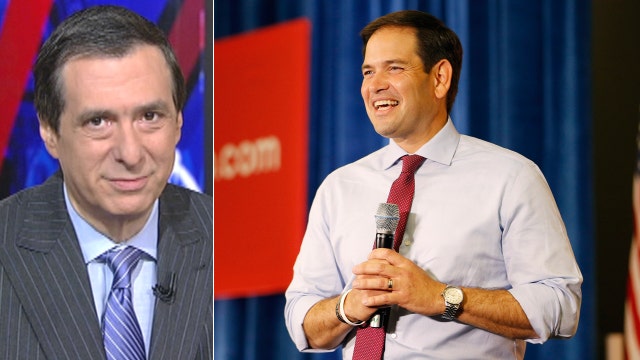Kurtz: Marco's muddled momentum
'Media Buzz' host reacts to recent press coverage of Marco Rubio's 2016 campaign
Despite the intense media spotlight on Donald Trump and now Ben Carson, many media insiders believe Marco Rubio could still snatch away the nomination.
On paper, Rubio is a strong candidate: Young, charismatic, Hispanic, son of immigrants, a great communicator, and hails from the crucial state of Florida. He’s certainly running a better campaign than his mentor, Jeb Bush, even though plenty of folks think he showed ingratitude by challenging the former governor.
Rubio’s liabilities are obvious as well, from pushing an immigration compromise detested by the Republican base to possessing the same amount of experience that Barack Obama had before winning the White House.
Rubio has risen to third place in the ABC/Washington Post poll, with 10 percent Republican support, behind Trump (32 percent) and Carson (22 percent) but ahead of Jeb (7 percent).
It’s tricky to figure out how the senator blazes a trail to the nomination, but it comes down to this: If you accept the notion that the GOP won’t nominate the two non-politicians—because that hasn’t happened since Ike, who won a war—then you position Marco as the one "establishment" candidate who could fill that vacuum.
That’s the case that conservative New York Times column Ross Douthat makes in predicting a Rubio nomination.
After ticking through why he believes the others will fade, Douthat says: “That leaves Jeb! and Marco Rubio. But Jeb’s campaign has been one long flail. His favorable ratings are terrible…
“So that leaves Rubio. And unlike all the rest, it’s surpassingly easy to imagine the Florida senator as the nominee. He sits close to the party’s center ideologically, and his favorable ratings with Republicans are consistently strong. He’s an effective debater with a great personal story and an appealing style, and a more impressive policy portfolio than most of his rivals. He scares Democrats in the general election, and strikes the most politically-useful contrasts with She Who Has Always Been Inevitable. His past support for comprehensive immigration reform is a major liability, but Rubio has shown a lot more finesse on that issue than has Jeb, and one liability isn’t usually enough to doom a candidate who otherwise looks like a winner.”
Obviously, an awful lot of assumptions are baked into this analysis. That’s why punditry is an art, not a science. Douthat admits that Rubio is “a very strange sort of front-runner” who hasn’t had impressive fundraising hauls or built a powerhouse organization. And what’s worse, which early state is Rubio going to win?
“He’s a little too moderate for Iowa, a little too conservative for New Hampshire, perhaps not quite combative enough for South Carolina … and so he might end up in the Rudy Giuliani-esque position of banking on his native Florida.”
Which didn’t work out so well for Rudy.
Just as Douthat is imagining President Rubio, the Washington Post tries to take him down a peg.
The nominal subject is Rubio missing a whole lot of Senate votes. I’ve always felt this is a dud of an issue. Most voters instinctively understand that you can’t spend that much time on the Senate floor when you’re out running for president. It doesn’t feel like a cutting issue to me.
But the Post piece elevates it to a more fundamental question about Rubio’s performance in his first national office:
“Marco Rubio is a U.S. senator. And he just can’t stand it anymore.
“‘I don’t know that “hate” is the right word,’ Rubio said in an interview. ‘I’m frustrated.’”
Not so bad at first. Why wouldn’t he be frustrated in the Senate, a chamber that has become synonymous with partisanship and gridlock?
Turns out that many of Rubio’s ideas fizzled in the Senate, other than one small-bore bill and a bunch of resolutions. He did get the immigration measure through the Senate as a member of the Gang of Eight, but the House did nothing and now Rubio himself says it was a mistake to push such a law without first securing the border.
Here’s the key graf about Rubio and the Senate: “Now, he’s done. ‘He hates it,’ a longtime friend from Florida said, speaking anonymously to say what Rubio would not. Which makes for an odd campaign message.”
It does make you wince a bit. He hates the Senate, but now he wants a promotion?
Again, there are reasons to hate the Senate. Obama didn’t love the Senate either. Unlike Rand Paul, who’s simultaneously running for reelection in Kentucky, Rubio is giving up his Senate seat in Florida and gambling everything on his White House bid.
Rubio told CNN’s Jamie Gangel over the weekend, “I’m not missing votes because I’m on vacation. I’m running for president so that the votes they take in the Senate are actually meaningful again.”
Florida resident Rush Limbaugh, for one, views this as a plus, since he views the Senate as a symbol of what ails the GOP:
"Rubio's a good guy. Some people say he made a misstep with the Gang of Eight, immigration bill originally, but the Senate is a place where nothing is getting done, the Senate is a place where the Republican establishment runs it...Marco Rubio was the future of the Republican Party for the longest time here in Florida before anybody else heard his name."
Rubio has always cast himself as an anti-establishment figure, noting that the GOP powers that be didn't want him to challenge Charlie Crist in 2010--or to take on Bush in 2016.
Florida is probably the only make-or-break state for Rubio. He leads Bush there in a poll last week, 15 to 9 percent, and whoever loses the Sunshine State in mid-March is toast. At the same time, Trump leads the state with 22 percent and Carson has 19 percent.
The specter of a stealth front-runner losing his home state only adds to the challenges swirling around Marco Rubio.













































